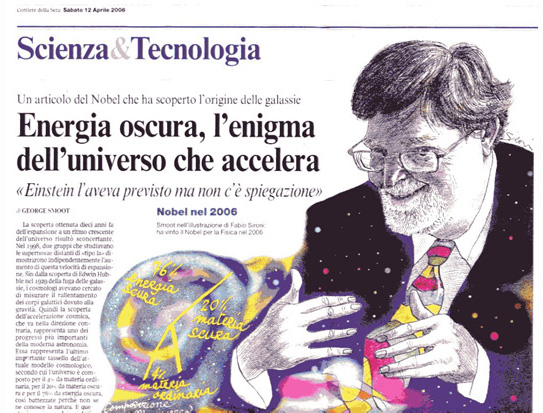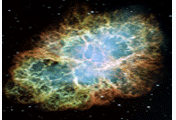 |
||
|
|
 |
|
A short portion of the public talk by Prof. George Smoot in front of the great pyramid in Chichen Itza as part of the winter school 'Essential Cosmology for the Next Generation'. |
|---|---|
|
Saul Perlmutter Wins 2011 Nobel Prize in Physics
_____________________________________________________________________________________
The Supernova Cosmology Project’s Union2 compilation and reanalysis represents decades of supernova surveys from the world’s leading researchers. Combined with the addition of six high-redshift supernovae, this effort puts new bounds on possible values for the nature of dark energy. Einstein’s cosmological constant comfortably fits the data, but there’s still plenty of room at the top for dynamical theories. Read more here.
_____________________________________________________________________________________
Protons were whipped around a 17-mile underground magnetic track to more than 99 percent of the speed of light at CERN's Large Hadron Collider on March 30th.They crashed together inside apartment-building-size detectors designed to capture every evanescent flash and fragment from microscopic fireballs thought to hold insights into the beginning of the universe. The soundless blooming of proton explosions was accompanied by the hoots and applause of scientists crowded into control rooms at CERN. Read more here.
_____________________________________________________________________________________
BCCP Hosts the 2011 Cosmology Workshop for High School Teachers and Students
_____________________________________________________________________________________
A team of astronomers led by Niv Drory of the Max Planck Institute for Extraterrestrial Physics, Kevin Bundy (UC Berkeley), and Alexie Leauthaud (LBNL and BCCP) used data from the COSMOS project to explore the connections between the growth of dark matter halos and the growth of galaxies within these dark matter halos.
_____________________________________________________________________________________
Weak gravitational lensing is a uniquely promising way to learn how much dark matter there is in the Universe and how its distribution has evolved since the distant past. Alexie Leauthaud's team has made major progress in extending the use of gravitational lensing to the study of much older and smaller structures than was previously possible.
_____________________________________________________________________________________
It takes special software to map the universe from noisy data. Berkeley Lab scientists developed a code called MADmap to do just that for the cosmic microwave background, then posted it on the web for other interested sky mappers. Scientists probing the sky with the PACS instrument aboard the Herschel satellite have adapted MADmap to make spectacular images of the infrared universe. Julian Borrill, Radek Stompor, and Andrew Jaffe devised the Microwave Anisotropy Dataset Computational Analysis Package, or MADCAP. Read more from Paul Preuss here.
_____________________________________________________________________________________
Music of the Universe _____________________________________________________________________________________
January 3, 2010 BCCP Director George Smoot discussed his achievements, activites, and the goals of BCCP, including the Global Teacher Academy. The Academy seeks to train 40 teachers a year using science and math content with cosmology as a "story line" and offering practical, hands-on instruction. Those teachers would then train the teachers at their own schools, expanding the reach of the program. Read more here.
______________________________________________________________________________________
November 29, 2009 George Smoot delivered a major address on observational cosmology to scientists, pontifical dignitaries, and Pope Benedict XVI at the 2009 conference at the Pontifical Lateran University in Rome. The event also celebrated the 400th anniversary of Galileo’s first observations with the telescope. While the pope indicated “there is no conflict on the horizon between scientific, philosophical, and theological knowledge,” he cautioned against the risk if man “relies only on science and forgets to raise his eyes beyond himself.” More on the conference here. _______________________________________________________________________________________
La prima luce dell' Universo December 3, 2009 Dr. Smoot gave a public lecture in Milano about his Nobel Prize winning research on the Cosmic Microwave Background. The program is entitled The First Light of the Universe. Poster pdf here.
_______________________________________________________________________________________
Lawrence Berkeley Lab and Korean University Sign Understanding George Smoot (center) represented Berkeley Lab at the signing of an agreement with representatives of South Korea’s University of Incheon to explore the potential for joint scientific research in energy, biology, accelerators, cosmology, and space. Hankyung News coverage of event (in Korean) _______________________________________________________________________________________
Chi ha detto che il cosmo è stato fatto per l’uomo? (Who said the universe was made for man?) October, 2009 Dr. Smoot discusses the history and fate of the universe with Italian periodical La Stampa (in Italian). PDF file of article.
_______________________________________________________________________________________
Dr. Smoot visits Ulsan Science High School in South Korea September, 2009 As part of the Global Teacher Academy outreach and education effort, Dr. Smoot lectured at the Science High School in Ulsan, South Korea. The school was established in 2003 for gifted students pursuing careers in science. Its goal is to foster creative leaders for the future through specialized science education.
_______________________________________________________________________________________
In what state is Acadia National Park? That was the final question posed to Berkeley Lab Nobelist George Smoot, a contestant on the popular "Are You Smarter Than a 5th Grader?" game show last Friday. With ominous music playing in the background and tension filling the air, Smoot vacillated between California and Maine, but finally declared his decision…Maine. It was correct and Smoot became only the second contestant to win one million dollars and the right to say: "Yes, I’m smarter than a 5th grader!" Go here to view a YouTube clip of the final question and ensuing celebration.
_______________________________________________________________________________________
POVO-Science & Technology conference:
Océ Technologies Auditorium, Venlo, The Netherlands
"La verità è il destino per il quale siamo stati fatti (Truth is the destiny for which we were made)". This article gives an example of how "truth" is achieved through "discovery" – the method used in science. By revealing nature, discovery is the way in which we can achieve truth, or at least glimpse it. But how can we know or have confidence that we have made a correct discovery? Here we can look to the major architect of the scientific method, Galileo Galilei: "La matematica è l'afabeto nel quale Dio ha scritto l'Universo" (Mathematics is the language with which God has written the universe). A discovery will be described best – and most economically and poetically – mathematically. Read full article. Letra Libres La época dorada de la cosmología - Cosmology's Golden Age en Español _______________________________________________________________________________________
_______________________________________________________________________________________
Online games spark girls' interests in science & technology
_______________________________________________________________________________________
Science Progress What Does This Generation Think it Means to be a “Scientist”?
______________________________________________________________________________
March 2009, Professor Smoot poses with members of The Institute of the Early Universe. He was featured in the April issue of a prominent Korean science magazine. PDF (in Korean)
______________________________________________________________________________
South Korea Ewha Academy Nobel Lectures with George Smoot The Dong-A Ilbo (one of South Korea's major newspapers) reports on Dr. Smoot's first public lecture. "In his first lecture as chair professor of Ewha Womans University in Seoul, 2006 Nobel Prize winner in physics George F. Smoot said Korean college students lack scientific fundamentals." Read more here.
____________________________________________________________________________________
George F. Smoot has been awarded the 2009 Oersted Medal George F. Smoot - Recognized for Outstanding Leadership in Physics Education. The American Association for the Advancement of Science selected Dr. Smoot as the winner of the 2009 American Association of Physics Teachers Oersted Medal. The Oersted Medal, established in 1936, recognizes those who have had an outstanding, widespread, and lasting impact on the teaching of physics. His research and writing on Cosmic Background Radiation anisotropy and the formation of galaxies has had a significant impact on our understanding of universe evolution, and on the teaching of physics and astronomy. The Oersted Medal will be presented to Dr. Smoot at a Ceremonial Session of the AAPT Winter Meeting in Chicago, Illinois, on Saturday, February 14, 2009. Following the presentation, Dr. Smoot will deliver his keynote address titled “The History and Fate of the Universe.” Read more.
_____________________________________________________________________________________
___________________________________________________________________________
March 2009, Dr. Smoot made a cameo appearance on "The Big Bang Theory" produced by Bill Prady and Chuck Lorre, Warner Bros. Studios for CBS. Watch full episode. LA Times Entertainment: What's Sheldon's deal? If you were a brilliant nerd, what would get you hottest under the collar?
____________________________________________________________________________
Serious Play - The Art Center Design Conference May, 2008 The biennial Art Center Design Conference was a three-day international gathering of entrepreneurs, thought leaders, and innovators from many fields and disciplines. The 2008 Conference, Serious Play, explored the essential role of play in business, the arts, science, storytelling, technology, and more. Professor George Smoot's talk, The Design of the Universe, gave viewers a new cosmic perspective by explaining the intricate designs found in nature. Playfully titled “CSI: Cosmic Scene Investigation” Smoot engaged the audience by examining the relics of creation, what happened at The Beginning, and how to understand it.
____________________________________________________________________________
A Nerdy Comedy's Winning Formula BURBANK, Calif. - During a recent taping of CBS's "The Big Bang Theory," the opening scene featured some unlikely dialogue for a prime-time comedy, including references to galactic dark matter and high-energy positrons. Almost as unusual as the science jargon: the live studio audience laughing at it. Read more from WSJ.
_________________________________________________________________________________
Berkeley Lab In The News: Smoot to Teach at New Silicon Valley University January, 2009 Starting this summer, some of the world's leading thinkers in exponentially growing technologies will be gathering annually at Nasa Ames Research Center, in the heart of Silicon Valley, for 10 weeks of discussions on how to change the future. The gatherings will be part of what is known as Singularity University. Among the faculty is Berkeley Lab physicist and Nobel Prize winner George Smoot. More here. _____________________________________________________________________________________
Last week, South Korea's Ministry of Education, Science, and Technology named Smoot a visiting scholar at Ewha (eee-hua) Womans University, a private university in Seoul where he will teach several courses over the next five years as he oversees the creation of the Institute for the Early Universe. Smoot was one of two Nobel Laureates chosen to set up top-notch research programs through South Korea's World Class University program. Read more from UC Berkeley News.
IEU Director George Smoot at the 2009 Nobel Forum May 2009
IEU Post Doc Announcement
IEU at EWHA Womans University in Seoul, Korea will provide cosmology education and training, conduct scientific research, and participate in major space projects. IEU is supported by EWHA University and the World Class University (WCU) project. WCU is the Ministry of Education, Science and Technology project designed to improve research programs of Korean universities. The Institute for the Early Universe will also be a partner in the Cosmology on the Beach conferences hosted by BCCP, The Institute for Advanced Cosmology, and the Universe Cluster.
Chanju Kim, George Smoot, Changrim Ahn, Il H. Park in front of the Ewha University Archive
_______________________________________________________________________________________
La Competencia Intelectual November, 2008 Dr. Smoot received an honorary doctorate degree from University Miguel Hernández (UMH) in Orihuela, Spain and was an inaugural guest at the opening of the Didático Interactive Museum of Science.
El primer museo interactivo de ciencias de la provincia abre sus puertas en Orihuela The first interactive museum of science in the province opens its doors in Orihuela (translated)
A multimedia science competition was held for students as part of the Didático Interactive Museum inaugural events. Students could create models, narratives, comics, or videos that explained scientific principles. Competion brochure (en español) Spain Slideshow
____________________________________________________________________________________
Nature Video presents five short films on the future of physics. Recorded at the 2008 Nobel Laureate Meeting in Lindau, these films capture the conversations between young researchers and physics Laureates George Smoot, William Phillips, John Hall, David Gross and Gerardus 't Hooft. Join them as they grapple with universal ideas including dark matter, dark energy, the Large Hadron Collider, space-time and quantum computing. _________________________________________________________________________________
The revolutionary discovery that the expansion of the universe is speeding up, not slowing down from gravity, means that 75 percent of our universe consists of mysterious dark energy. Berkeley Lab physicist Eric Linder delves into the mystery of dark energy as part of the Science in the Theatre lecture series on Nov. 24, 2008.
____________________________________________________________________________
Guests included global scholars and Nobel Prize winners, who gave academic lectures and presided over forums. There were multi-level discussions on academic, social, and industrial issues. Nobel winners, Chinese scholars, and Chinese government officials exchanged ideas and sought to promote international cooperation. Dr. Smoot lectured on the "Singularity University: Preparing Humanity for Accelerating Technological Change"
___________________________________________________________________________
George Smoot wins Oersted Medal November, 2008 The American Association of Physics Teachers recently announced the awarding of the Oersted Medal to Berkeley Lab physicist and Nobelist George Smoot. The award recognizes “his outstanding, widespread, and lasting impact on the teaching of physics.” The Oersted Medal is named for Hans Christian Oersted (1777-1851), a Danish physicist who, in the course of creating a demonstration for teaching his class, discovered that electric currents caused a magnetic field. The annual award was established in 1936. (From Today at Berkeley Lab)
PDF of press release ____________________________________________________________________________________
Geneva, 10 September 2008. The first beam in the Large Hadron Collider at CERN was successfully steered around the full 27 kilometres of the world’s most powerful particle accelerator at 10h28 this morning. This historic event marks a key moment in the transition from over two decades of preparation to a new era of scientific discovery. _______________________________________________________________________________________
Chilean President Bachelet Visits Lawrence Berkeley Lab to Learn about Research on Renewable Energy and Conservation June 13, 2008 President Bachelet and members of her delegation were greeted at Berkeley Lab by Nobel Laureate George Smoot; James Siegrist- Associate Laboratory Director for General Science; and Harley Shaiken - Chair for Latin American Studies on the campus of the University of California at Berkeley. Read more from the Berkeley Lab News Center.
_______________________________________________________________________________________
Hawking, NASA Head, Nobel Winners Visit The African Institute for Mathematical Sciences (AIMS) May 2008
AIMS welcomed a stellar group of scientists and engineers to the launch of the NextEinstein initiative on May 11, and the opening of the AIMS Research Centre on May 12. The group included the famous cosmologist Stephen Hawking, the NASA Administrator Michael Griffin, and the winners of the 2004 and 2006 Nobel Prizes in Physics, David Gross and George Smoot. Many distinguished pan-African and international scientists, business and technology leaders, and political representatives also participated. Read more about AIMS - PDF
Read more about NextEinstein - PDF
The National Institute for Theoretical Physics May 2008 The launch of The National Institute for Theoretical Physics (NITheP) was held at the new Wallenberg Research Centre of the Stellenbosch Institute for Advanced Study (STIAS). The event was attended by David Gross, Stephen Hawking, and George Smoot. NITheP is a geographically distributed institute which also has regional centres at the Universities of KwaZulu-Natal and the Witwatersrand. It is being positioned as a national and African user facility for theoretical physics and will provide theoretical underpinning for current national programmes including astrophysics, cosmology, nuclear and particle physics, quantum technologies, condensed matter physics and quantum optics. Read the proposal for the National Theoretical Physics Facility for South Africa (PDF) _______________________________________________________________________________________
60 of the world's greatest minds share their vision of the next half century in the new Mike Wallace book. Astrophysicists, conservation biologists, economists, military commanders, internet pioneers, neurologists and more provide commentary and insight about the new century and our near future. Included is an essay by BCCP director George F. Smoot: "A Tiny Dot in Cosmic Time; A Big Period in Human Time." LA Times Article PDF Press Release PDF
_______________________________________________________________________________________
Ten years ago two teams discovered that the universe will expand forever at an ever faster rate, thanks to an unseen energy. The leader of one of the groups, Saul Perlmutter, expects that new observations will soon illuminate the universe's dark side. Read more by David Appell Scientific American Q & A with Saul Perlmutter
Saul Perlmutter announced the Supernova Cosmology Project's evidence for a cosmological constant at the annual meeting of the American Astronomical Society in Washington, D.C., on January 8, 1998. On February 18 of that year, Gerson Goldhaber and Perlmutter discussed the SCP evidence at the UCLA conference on Dark Matter in Los Angeles, where Alexei Fillipenko announced similar results from the High-Z Supernova Search Team. What they had observed was the accelerating expansion of the universe, presumably caused by Einstein's cosmological constant (lambda). Initially a purely mathematical term in the equations of General Relativity — which Einstein later dropped — theorists by the end of the 20th century had come to regard the cosmological constant as a manifestation of the vacuum energy described by quantum mechanics. Dark Energy's 10th Anniversary Part I, Announcing the accelerating universe
The proposed SuperNova/Acceleration Probe (SNAP) satellite inspired DOE and NASA's Joint Dark Energy Mission. It will find and measure thousands of Type Ia supernovae and will measure the distribution of matter in the universe through weak gravitational lensing. Read more
Expansion History of the Universe _______________________________________________________________________________________
That was the whole problem, explained Dr. Livio, a theorist at the Space Telescope Science Institute here on the Johns Hopkins campus. A decade ago, astronomers discovered that what is true for your car keys is not true for the galaxies. Having been impelled apart by the force of the Big Bang, the galaxies, in defiance of cosmic gravity, are picking up speed on a dash toward eternity. If they were keys, they would be shooting for the ceiling. “That is how shocking this was,” Dr. Livio said. Read more shocking revelations here.
'Saul Perlmutter of the Lawrence Berkeley National Laboratory in California led the team examining a kind of exploding star known as a Type 1a supernova as standard candles — objects whose distance can be inferred from their apparent brightness to investigate the history and fate of the universe. They found, on the basis of a few dozen of these stars, that the more distant ones were dimmer than expected, meaning that they had been carried farther away by the cosmic expansion than expected, meaning that the universe was speeding up. The car keys were streaking for the ceiling...' PDF of this article _______________________________________________________________________________________
_______________________________________________________________________________________
April, 2008 Dr. Smoot wrote an article for the 10th anniversary of dark matter that appeared in the Milano Newspaper "Il Corriere della Sera."
______________________________________________________________________________________
_______________________________________________________________________________________
Contemplating Important Days in the History of the Universe (CNN)
_______________________________________________________________________________________
|
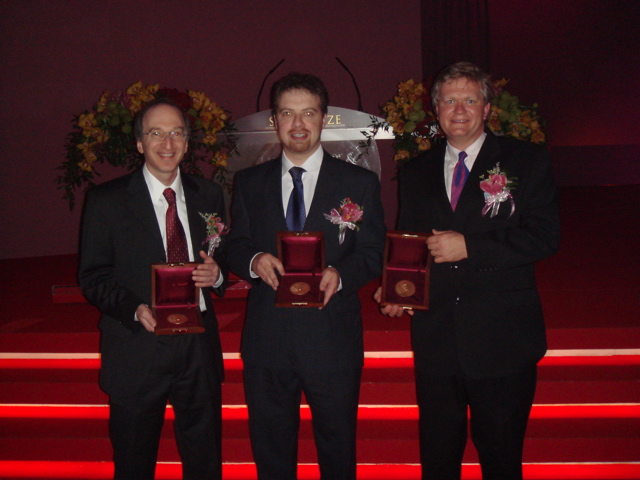
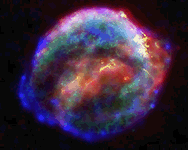
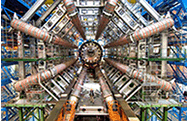 Let the Games Begin
Let the Games Begin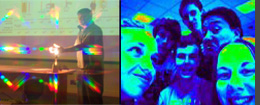
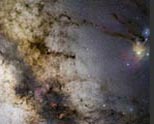 Split Personalities Of A Galactic Size
Split Personalities Of A Galactic Size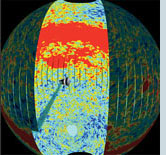
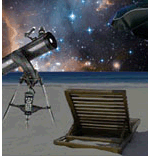
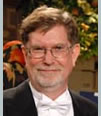
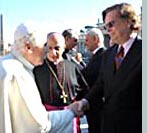
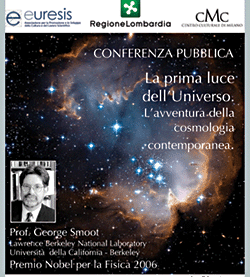
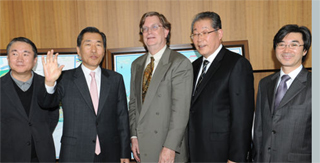
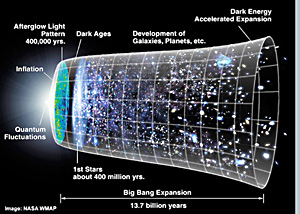
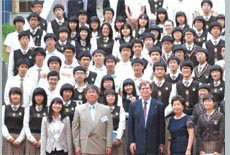


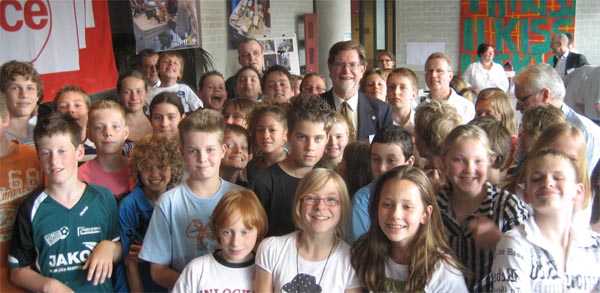

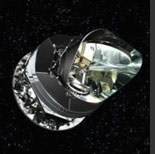


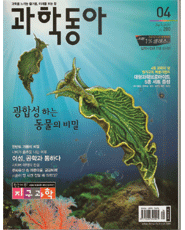
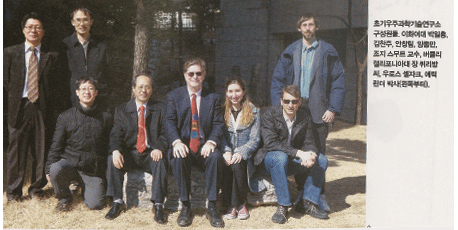
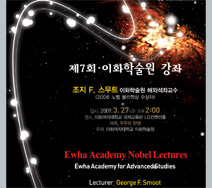



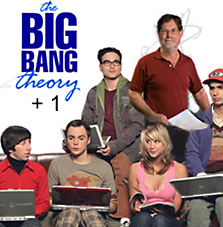
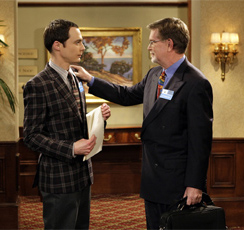
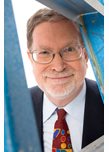
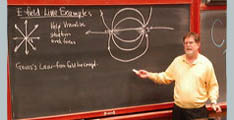

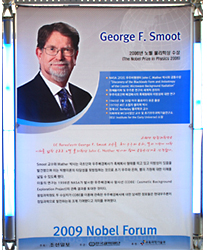
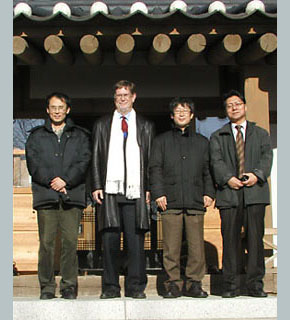
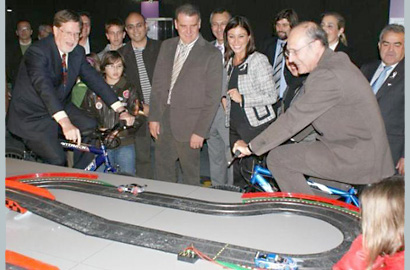
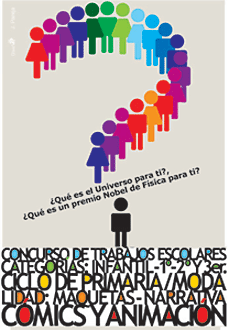

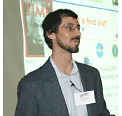

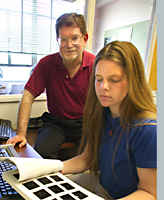
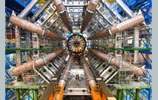
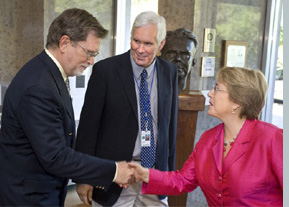
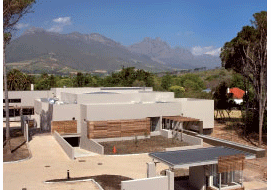

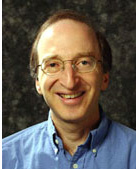

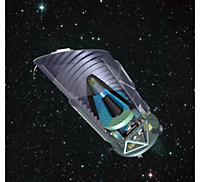


 George Smoot
George Smoot